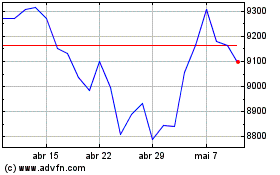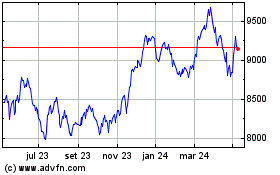By Steven Russolillo and Ben Dummett
This article is being republished as part of our daily
reproduction of WSJ.com articles that also appeared in the U.S.
print edition of The Wall Street Journal (September 12, 2019).
Hong Kong's stock exchange made an unsolicited $36.6 billion
offer to acquire its London-based rival, a deal that would unite
two of the world's major trading hubs when both are under severe
political pressure.
Hong Kong is reeling from a summer of increasingly violent
protests, with scenes of tear gas and Molotov cocktails playing out
virtually every weekend on live television. London, meanwhile, is
gripped by political paralysis as successive governments fail to
find a way to implement an exit from the European Union due to take
place next month. Bankers in both cities are trying to figure out
whether things could get bad enough to force them to move out.
And yet Hong Kong Exchanges & Clearing Ltd. has picked this
moment to launch what would be its biggest deal. A combination with
the London Stock Exchange would create a global leader in capital
flows and financial data by connecting developed and emerging
markets in the East and West. It would also thwart the LSE's
ambitions to transform itself from an exchange into a full-fledged
data business by acquiring financial-information provider Refinitiv
Holdings Ltd., which used to be part of Reuters, for $14.5 billion
in stock.
Data is expected to be a key battleground for exchanges in the
coming years as many rethink their historical reliance on listing
and trading companies and look for new revenue streams based on the
vast amounts of data flowing through them.
The Hong Kong group's approach and its public announcement
Wednesday took the LSE's leadership off guard, according to a
person familiar with the matter.
The exchange's Chief Executive Charles Li met his counterpart at
the LSE, David Schwimmer, and the LSE chairman Monday in London,
the person said. The HKEX asked for the meeting, saying that some
of its executives would be in the city that day, and the LSE
assumed it was a general meeting with no specific agenda, the
person said. But when the two sides met, Mr. Li surprised LSE
executives by presenting the proposal, and a letter detailing the
proposal followed later Monday, the person said.
The LSE's board will determine the company's next move when it
meets, the person said. The date of that meeting couldn't be
learned.
The public disclosure of the offer came Wednesday. The Hong Kong
exchange decided to make its offer public so that shareholders of
both companies could assess its merits, according to another person
familiar with the matter.
"You don't choose timing, you choose what is the right thing to
do," Mr. Li said during a conference call Wednesday.
The London exchange criticized the offer as "preliminary and
highly conditional." It said it would consider the proposal but
remains committed to the Refinitiv deal.
"We are here like a corporate Romeo and Juliet," Mr. Li, said on
the conference call. "We know we were late...We want to openly
express our admiration."
The Hong Kong exchange could face significant political hurdles
to completing a deal. A number of transactions have been scuttled
by concerns about Chinese access to sensitive data, and financial
information is high on the sensitivity index. Hong Kong enjoys
significant autonomy from China -- with a separate legal system and
freely convertible currency -- but recent political moves have
tested those boundaries.
"Any regulator would need to think carefully about the
implications of the political situation and Beijing's increasing
control over Hong Kong, " said David Webb, an outspoken private
investor in Hong Kong. "This strikes me as an aspirational proposal
that probably won't go through."
"This has nothing to do with Hong Kong's situation," Mr. Li
said.
The Hong Kong exchange said its offer -- valued at GBP29.6
billion in cash and stock -- represents a 22.9% premium to the
London exchange's closing stock price on Tuesday. It proposed
paying roughly a quarter of the purchase price in cash and the rest
in stock.
"This is an audacious move," said Larry Tabb, founder and
research chairman of the financial markets research and advisory
firm Tabb Group. "LSE is one of the few really prestigious global
exchange brands."
LSE shares, which have soared following the Refinitiv deal
announcement, jumped as much as 16% Wednesday before trimming some
gains.
The London Stock Exchange, which traces its history back
hundreds of years, has proven one of the world's most difficult
acquisition targets over the past two decades. German rival
Deutsche Boerse AG has twice failed to take over the exchange, as
has the technology-heavy U.S. exchange Nasdaq Inc. A Swedish
exchange and Australian investment bank Macquarie Group also
haven't completed takeovers.
"This deal seems so out of left field, especially after
Refinitiv," said Brad Bailey, research director for capital markets
at Celent in New York. "I was very surprised."
If the Hong Kong exchange's bid for LSE succeeds, it would
create an Asian-European giant that would rival the two biggest
players in the global exchange business, both of them U.S. firms:
Chicago-based CME Group Inc. and Atlanta-based Intercontinental
Exchange Inc., or ICE.
CME has a market capitalization of over $72 billion, while ICE
-- the parent of the New York Stock Exchange -- is worth about $50
billion. Both U.S. firms rode a wave of consolidation in the
exchange business over the past two decades to amass more heft than
their European and Asian rivals.
Mr. Li, in a blog post on the Hong Kong exchange's website, said
the proposal comes after "many months of consideration" and marks a
milestone for the city, which has built itself into a global
financial center as China's economic growth has accelerated. He
said a partnership between the two exchanges "will strengthen ties
between the U.K. and China, particularly in economic and trade
terms."
"We are looking forward to further conversations and to take a
deeper dive," Mr. Li said on Wednesday.
The Hong Kong exchange dominates its home market and has thrived
by plugging mainland China into the global financial system,
initially through hosting stock listings, and more recently through
trading arrangements that connect the world's investors to
otherwise hard-to-access markets in Shenzhen and Shanghai.
Last year it made a record profit of roughly $1.2 billion, equal
to nearly 59 cents out of every dollar it took in as revenue or in
other ways, chiefly as income on investments.
Hong Kong is a crucial throughway for capital flows into and out
of China. The exchange was the world's biggest for initial public
offerings last year, lifted by multibillion-dollar share sales by
several of China's most valuable technology and internet
companies.
The dollar value of new listings in Hong Kong has shrunk sharply
this year, and trading has slowed, as trade tensions, China's
economic slowdown and unrest in the city have dented market
sentiment.
Companies raised $9.5 billion via Hong Kong IPOs in the year
through Wednesday, or roughly 40% of the total raised in the same
period last year, according to Dealogic. In July, Anheuser-Busch
InBev SA halted a near-$10 billion listing of its Asian unit,
blaming market conditions.
In August, the average daily turnover of securities traded on
HKEX fell 8.4% from a year earlier.
Julie Steinberg and Alexander Osipovich contributed to this
article.
Write to Steven Russolillo at steven.russolillo@wsj.com and Ben
Dummett at ben.dummett@wsj.com
(END) Dow Jones Newswires
September 12, 2019 02:47 ET (06:47 GMT)
Copyright (c) 2019 Dow Jones & Company, Inc.
London Stock Exchange (LSE:LSEG)
Gráfico Histórico do Ativo
De Mar 2024 até Abr 2024

London Stock Exchange (LSE:LSEG)
Gráfico Histórico do Ativo
De Abr 2023 até Abr 2024
